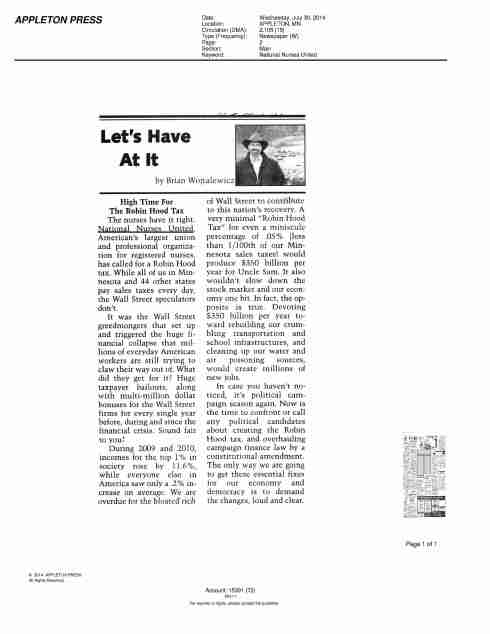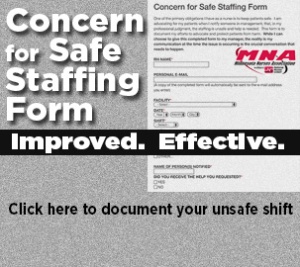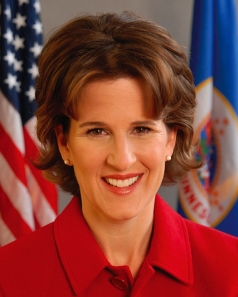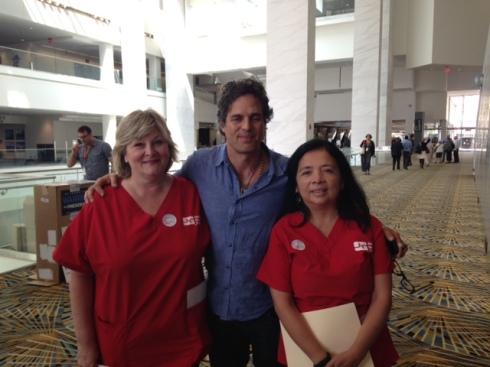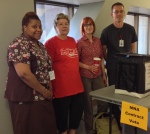Category Archives: Minnesota Nurses Association
Standing up for safe patient care just got easier
It’s now much easier for Minnesota nurses to stand up for safe patient care.
Now when nurses submit submit Concern for Safe Staffing forms that document unsafe conditions in their facilities, they can also contact their legislators to let them know that unsafe staffing situations are occurring in their districts.
State senators and representatives have asked for more documentation to help them establish a safe patient standard in Minnesota hospitals.
In the past, CFSS forms have had to be culled, collected, and printed out to submit to legislative committees or for lawmaker requests. MNA recently modified the form to make it easier for nurses to tell their legislators real-time stories about unsafe staffing in their hospitals.
The revised form adds one simple step. After nurses complete a Concern for Safe Staffing form, they will receive a confirmation message with a link to a short pre-written email to their legislators to which they can add their own comments. The MNA website will automatically look up the nurses’ legislators and deliver the messages to them.
Some legislators have questioned whether staffing is a problem in Minnesota hospitals. When nurses show the forms to state legislators as examples of the unsafe conditions in hospitals in their districts, lawmakers are always surprised and concerned to learn hospitals put patients at risk on a regular basis.
The new option to contact legislators will increase the impact of CFSS forms by alerting lawmakers to the frequency and severity of these unsafe situations, and will further our campaign to pass a Safe Patient Standard law.
MNA members are encouraged to fill out CFSS forms any time they see unsafe staffing, and if you live in Minnesota, send the follow-up message to your legislators.
Primary Election August 12-MNA Supports Rebecca Otto for Auditor
Minnesota’s primary election is Tuesday, August 12. You have a chance to return one of the most accomplished state auditors in the country to her post.
MNA has endorsed Rebecca Otto for State Auditor. Otto has carefully served as a watchdog for local governments, including her role in reviewing almost 700 public pension plans, and promoting legal compliance and accountability.
Rebecca Otto (DFL) is one of the most highly-respected state auditors in the United States. In 2014 she was named one of the Most Influential Professionals in Government Auditing by the American Center for Government Auditing (ACGA). She has also received the National Auditors Association Excellence in Accountability Award for Best Practices Review: Reducing Energy Costs in Local Government. In 2011 she received the League of Minnesota Cities President’s Award.
Rebecca Otto has done an outstanding job for the citizens of Minnesota, and the Minnesota Nurses Association is proud to support her.
Not registered? You can register at the polls!
Sign up for the Minnesota State Fair!
Join MNA nurses by speaking up for your profession and a minimum standard of care at the 2014 Minnesota State Fair. Go to www.mnnurses.org to sign up. Volunteer shifts are filling up fast!
Grand Itasca negotiations ‘respectful’
Negotiations between nurses and Grand Itasca Clinic and Hospital in Grand Rapids were marked by ‘mutual respect’ this spring, leading to a new contract that benefits nurses and patients.
“We had very respectful bargaining,” said Grand Itasca Bargaining Unit Chair Pam Nordstrom. “Negotiations moved more smoothly and we won some major improvements for members.”
“We always tried to keep patients at the forefront during negotiations,” said bargaining committee member Carol Forneris. “We wanted to ensure quality staff, because that goes hand in hand with good patient care. “
Members ratified the new contract on June 16. It includes:
- 6.5 percent raises for hospital RNs over three years;
- 8 percent raises for clinic RNs over three years;
- Staffing language that supports acuity and nursing intensity. MNA and Grand Itasca will develop staffing plans that take patient care needs/acuity, unit census, and skill level of professional nursing staff into account. Grand Itasca will consider input from the charge nurses or primary care nurses when making staffing decisions.
- Language that preserves the union if the hospital’s ownership changes.
Fairview Lakes nurses gather early this
Fairview Lakes nurses gather early this morning for last day of bargaining before Aug 4 informational picketing. http://ow.ly/i/6nLmG
Sandstone nurses vote for their first contract
Essentia Health-Sandstone nurses have a new contract – their first.
Members approved a new four-year contract earlier this month, following two years of organizing and negotiating.
Sandstone nurses organized right after Essentia bought the hospital in 2012.
“We are very excited to have a contract with language that ensures safe staffing, addresses on-call shifts, and gives nurses a stronger voice in our workplace,” said bargaining unit MNA Co-Chair Erin Olson, RN. “The feedback from fellow nurses has been very positive.”
The four-year contract includes:
- Wage increases of 11 percent over the four years;
- Orientation and training language modeled on metro nurses’ contracts;
- On-call pay raise from $4 per hour to the minimum wage;
- Reimbursement raise from $400 to $700 for continuing education;
- 401(k) contributions from 3 percent to 7 percent.
“We are most happy to have a voice and solidarity in our dealings with management from now on,” said Olson.
Nurses: Water Shut-off Measure in Detroit Endangers Public Health
National Nurses United
Media Advisory, Photo Opportunity July 18, 2014
Contact: Liz Jacobs, RN, 510-435-7674, Bill Gallagher, 818-355-8691, or Sarah Cecile, 510-541-9570
Big March and Rally Today in Detroit to Protest Water Shutoffs by City: ‘Turn On the Water, Tax Wall Street’
Responding to the controversial decision of Detroit and Michigan officials to shut off water for tens of thousands of city residents, a broad coalition of national, international, and Detroit area organizations will hold a major protest march and rally today in Detroit.
Marchers will voice support for the many in Detroit who have been calling for a declaration of a health care emergency in the city and call for an immediate moratorium on the water shutoffs and restoration of water service to those who have had their water cut off.
Lack of access to clean water is a major health threat that can lead to the growth and spread of infectious diseases and even pandemics, says National Nurses United, the largest U.S. organization of nurses and the lead sponsor of the march and rally.
Activists also warn that the widespread water shutoffs are a national test case, promoted by the banks and other financial interests who have been pushing privatization of public resources in economically embattled Detroit. If successful in Detroit, the scene could be repeated in scores of other communities where residents continue to struggle financially.
The march begins at 1 p.m. at Cobo Center in Detroit. The rally, outside Hart Plaza, will be live streamed at http://www.ustream.tv/channel/national-nurses-united
Support for the action has been rapidly building with major endorsements and participation from among others the International Union United Automobile, Aerospace & Agricultural Implement Workers of America (UAW AFL-CIO), Netroots Nation which is holding its convention in Detroit this week, Food and Water Watch, Michigan Sierra Club, Utility Workers Union of America, Friends of the Earth U.S., the Canadian Federation of Nurses Unions, and scores of Detroit area community, labor and faith groups.
Internationally known actor Mark Ruffalo and musician/songwriter Tom Morello also voiced support for the action, urging support, on twitter.
Listen to the NNU Radio ad here:
The event will also call for a tax on Wall Street speculation which could raise hundreds of billions of dollars for communities like Detroit which have been pummeled by recession, unemployment, and other pain directly linked to the Wall Street meltdown and plunder of major urban areas. The Robin Hood tax on Wall Street trading, is embodied in HR 1579, sponsored by Rep. Keith Ellison, to rebuild Detroit and the rest of America.
Rally supporters charge that Gov. Rick Snyder and emergency manager officials are enforcing the water shutoffs to promote the privatization of the public water supply, the latest gift, they say, to Wall Street financial interests who have bankrupted the city.
Notably Snyder’s handpicked emergency manager Kevyn Orr in one of his first acts hired his former employer, the Jones Day law firm to supervise the city’s bankruptcy even though that same firm represents banks that hold the city’s debt. Further, city activists note that though commercial enterprises owe nearly half of the debt to the water department, it is low and moderate-income residents who have been the main target of water shutoffs.
‘Dangerous public health crisis’
“Cutting off water to community residents is a disgraceful attack on the basic human right of access to safe, clean water,” said NNU Co-President Jean Ross, RN. “Nurses know the critical link between access to water and public health. Lack of water, like unsafe sanitation, is a major health disaster that can lead to disease outbreaks and pandemics. The city must end this shutoff now.”
“The water crisis is just the tip of the spear of what is a much greater systemic problem in America,” said Monica Lewis-Patrick, citywide outreach coordinator of We the People of Detroit and member of the People’s Water Coalition. “People need housing, good jobs, equal access to quality education and affordable health care and of course what we are now dealing with here, access to clean affordable water which is a basic human right. It is my hope that everyone who is coming to Detroit to take part in the protests also takes away the story of resilience and perseverance of the people of Detroit. I’ve been going to door to door to assist people and what I’ve witnessed is that in the midst of all these trials folks are together forging the beloved community.”
“It appears the black out on this water crisis is broken and the consciousness of the world has finally been piqued. People around the world are beginning to focus on this domestic terrorism and we welcome every eye!” said Maureen Taylor, state chairperson of Michigan Welfare Rights Organization.
“The situation in Detroit is a major crisis, said Food & Water Watch Executive Director Wenonah Hauter. “When 45 percent of water customers struggle to pay their water bills, it is clear that this is not just a problem with delinquent payment–it’s indicative of broader, systemic issues resulting from decades of policies that put profits before people. These shutoffs are a thinly veiled precursor to privatizing Detroit’s water, which will only make matters worse. We urge Detroit’s leadership to turn the taps back on and keep water there in public hands so that all residents can have affordable access to this vital resource.”
“This dangerous public health crisis is further proof that we don’t have a bankrupt city – we have a bankrupt system,” said John Armelagos, RN, president of the Michigan Nurses Association. “It’s disgraceful to have children in the wealthiest nation on Earth on the edge of living in third-world conditions. When people don’t have access to water to bathe and brush their teeth with, they and their families, and the whole community, are at risk for disease. Water is a human right and (Emergency Manager) Kevyn Orr should put human needs above any agenda set by corporations that only want to further exploit Detroit.”
“We’re proud to stand in solidarity with the organizers working hard to stop these water shutoffs,” said Raven Brooks, Executive Director of Netroots Nation. “It’s vitally important for us to use our platform to amplify their message.”
Other endorsers of action include: People’s Water Board, Metropolitan Detroit AFL-CIO, Michigan Nurses Association, We the People of Detroit, Moratorium Now!, Michigan Welfare Rights Organization, United Students Against Sweatshops, AFSCME Council 25, CWA Local 400, National Action Network-Michigan, UAW Locals 600 and 4911, Detroit Eviction Defense, Detroiters Resisting Emergency, National People’s Action, Health GAP (Global Action Project), East Michigan Environmental Action Council, Color of Change, Franciscan Action Network, Detroit Water Brigade, Detroit Public Schools Education Task Force, Michigan Election Reform Alliance, Student Global AIDS Campaign, New York State Nurses Association, Coalition of Labor Union Women, and Detroit Active and Retired Employees.
HCMC contract builds on success
Nurses at one of Minnesota’s largest hospitals have a new contract that makes significant improvements in compensation and working conditions conditions that will help recruit and retain nurses at the busy urban Level 1 Trauma facility.
Hennepin County Medical Center nurses overwhelmingly voted in favor of a new three-year contract in June.
“It was time for us to enrich our contract and provide some of the benefits enjoyed by the other metro hospitals,” said HCMC Co-Chair Michele Will, RN. “I think we made steps in that direction. We were able to secure education money for all nurses and increase the number of weekends off for nurses with ten years of seniority who work every other weekend. The nurses I have spoken to are very appreciative of these new benefits.”
Highlights include:
- Additional health and safety language;
- A standardized staffing process;
- Moving toward absolute parity with other Metro hospitals, including up to 3 percent wage increases in the first year;
- Locked-in insurance percentage for the life of the contract;
- Short-term and long-term disability insurance paid by the hospital;
- Education reimbursements for the first time.
“As a newer unit, we’re building on each contract,” said HCMC MNA Nurses Co-Chair Meg Ploog, RN. “We’re adding major improvements each time we bargain.”
HCMC organized with MNA in 2006.
Members say they’re happy to be part of MNA.
“I feel like we’re more protected with a contract,” said Sharon Jestus, RN. “We’re more vulnerable without a contract.”
“Get involved,” said RN Jimmy McMurray, who started filling out Concern for Safe Staffing forms when he saw that staffing levels on his floor were not allowing nurses to provide adequate care to patients. His actions showed other nurses that they could speak up and cause change. “If we don’t stand up for what’s right, no one will.”
Fairview Lakes fights ‘offensive’ proposals
Nurses at Fairview Lakes Medical Center in Wyoming, MN, are fighting for contract advancements to protect patients, recruit and retain exceptional nurses, and to stop management efforts to take back hard-fought compensation and benefits.
Negotiations officially began in June, with management proposing to deny health insurance coverage and other benefits to almost a dozen nurses who work half time, increase mandatory low-need days by 50 percent, and continue inequitable pay differentials between clinic and hospital nurses.
“These proposals are offensive and unrealistic,” said Fairview Lakes MNA Co-Chair Sandie Anderson, RN. “Management is treating nurses as second-class citizens.”
Nurses are asking management to make a commitment to patients to ensure there will be adequate staff to care for them and to personally explain to patients if staffing falls below planned-for levels. Additionally, nurses are asking for improvements to wages and benefits. Sadly, management has failed to make efforts to advance patient safety or to provide nurses with a more secure economic future.
Nurses are calling on Fairview Lakes to:
- Protect patients;
- Address inequities between nurses who perform the same work;
- Retain nurses;
- Protect the future of nursing.
“Fairview should not try to increase profits on the backs of nurses,” Fairview Lakes Co-Chair Susan Kreitz, RN, said. “We are asking Fairview Lakes to put patients and the nurses who care for them first. That means addressing inequities including an unfair pay differential between clinic and hospital nurses.”
Nurses are speaking out about the unequal compensation of clinic and hospital nurses in a new video. The video highlights the high level of care clinic nurses provide to their patients and why clinic nursing is not of lower value than hospital nursing at Fairview Lakes.
